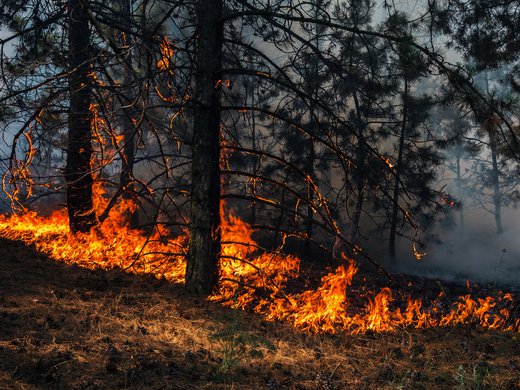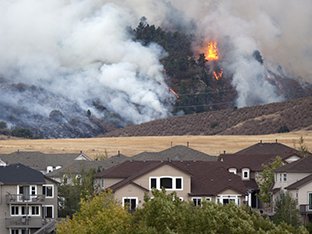In recent weeks, people around the globe have struggled with extreme weather such as heatwaves, wildfires, drought, coastal erosion, permafrost thawing and severe flooding. In Canada — where 570 died from record heat in British Columbia and the entire town of Lytton burned down, scorching temperatures killed crops on the vine and wildfire smoke blanketed the country — people are experiencing what experts have warned about for decades: climate change is affecting us where we live, and undermining our ability to live where and how we have chosen.
Many describe climate change as a national security threat. In a 2021 journal article, I outlined five climate-related threats to Canada: human insecurity, economic threats, Arctic threats, humanitarian crises and increased domestic conflict. Climate security scholar Simon Dalby recently argued in this space that “Canadian national security needs an update for climate.” We are part of a CIGI project titled and aimed at “Reimagining a Canadian National Security Strategy for the Twenty-First Century” that builds on previous calls noting how the climate emergency threatens public safety, vulnerable peoples and the Arctic — including those from Inuk leader Mary Simon, Canada’s new Governor-General. Globally, US Presidents Joe Biden and Barack Obama, the UN Secretary-General, and many leaders and institutions acknowledge, in ever more dire terms, that climate change is the foremost security issue of our time, and threatens a century of progress in the improvement of human well-being and expansion of human rights.
Yet despite the danger to lives and livelihoods, climate change isn’t treated as a security issue. Canada’s two most recent defence strategies barely mention it, and climate-related threats are inadequately addressed by governments at all levels. This shortfall in climate planning and preparedness increases the risk of simultaneous and compounding climate-related crises. As we face more and more severe climate disruption, these inadequacies will fuel acute and chronic insecurity for Canadians in much the same way bad governance combines with external events to produce humanitarian crises elsewhere in the world. Climate change threatens the security of people from coast to coast to coast; defending ourselves from the changes already here and those to come is a more Herculean task than any we have previously faced.
Calling Climate Change a Security Threat
What does it mean to call climate change a security threat? What difference does it make? In the academic study of security, as author Michael Sheehan explains in his 2005 book, securitizing an issue means “to challenge society to promote it higher in its scales of values and to commit greater resources to solving the related problems.” In this account, security issues are those that endanger something of collective social value and that we choose to prioritize defending against. On the one hand, when something is accepted by the general public as a threat to their security, governments may enact measures that would not normally be permitted. On the other hand, practices that enable whatever is defined as threatening become forbidden or taboo. Securitization means prioritizing public resources and state capacity, and determining which actions must be taken and which may not, for survival to be maximized. Consider threats associated with such world-altering events as World War II, the Cold War and the September 11 terrorist attacks. In each case, once a threat was accepted — whether fascism, authoritarian socialism or terrorism — governments transformed the focus and intensity of their efforts to combat it, while practices they previously engaged in — such as collaborating with the Nazis, cooperating with the Soviet Union and financing terrorist entities — had to cease. Author Seth Klein makes precisely such comparisons in his recent book on “mobilizing Canada for the climate emergency.”
Calling something a security threat isn’t a magic bullet; the failed wars on drugs, crime, poverty and terrorism clearly show that securitization doesn’t guarantee effectiveness. In a free society, securitization also comes at a cost. There is always tension between empowering governments to take emergency measures and the normal function of democratic institutions and civil and political rights. But in times of existential crisis, such as those moments when the survival of large numbers of people, cherished values or whole societies are threatened, designating something a security threat can be a catalyst for government-led, whole-of-society efforts to respond.
In that light, what does it mean to securitize climate change in Canada? What exceptional measures would be enabled and which practices prohibited? Many domestic policy steps are clear: mandatory adaptation for climate changes already here and those that cannot be avoided include building more resilient infrastructure; adjusting practices for agriculture, forest, fisheries and freshwater management; greening the energy system; and requiring climate change-informed planning for all planning processes, such as housing and transportation.
In its foreign policy, Canada could treat actors that reject emissions reductions, or obstruct and undermine the international climate regime, the same way it treats other gross violators of human rights and international norms: through tools of statecraft including negotiation, diplomatic pressure, and sanctions on individuals, corporations and, if necessary, whole states. The Canadian Armed Forces, already active in responding to extreme weather events, should be expanded and equipped for that task, making it an armed forces as prepared to maintain civil order during a climate emergency as it is for territorial defence and fighting wars abroad.
But a safer future requires that we not only fortify where we live but transform how we live to stop fuelling the problem, namely, by emitting greenhouse gases (GHGs) from the combustion of fossil fuels and changing land use on the Earth’s surface. This would mean revising how we design communities; assign value to different goods, services and experiences; and regulate the economy, including, obviously, the oil and gas sector. We cannot address climate change unless we change, and those who say different are selling something. Beyond the moral responsibility Canadians bear for reducing our world-leading per capita emissions, with the global economy transitioning rapidly away from fossil fuels, Canada cannot remain prosperous without decarbonization. Nor can Canada be a good international citizen or climate leader so long as it willfully contributes to the root cause of climate change.
This is no mean feat: GHG emissions are embedded in our industrial and commercial processes, and within our cultural norms. We live in a hydrocarbon society, and weaning ourselves requires time, effort, money and a willingness to change. Treating climate change as a security issue thus requires nothing less than strong public and governmental consensus for an integrated, whole-of-government response across all levels of the Canadian federation. Without one, climate change will render Canadians increasingly insecure while Canada keeps contributing to worsening insecurity for people around the world.
The reality is that economic reliance on fossil fuels is unevenly distributed across Canada, skewing the costs and social consequences of decarbonization.
Securitization and the Obstacles of Canadian Politics
So, why is climate change not securitized in Canada? Two principal reasons emerge from Canada’s political system: federalism and partisanship. Canada’s federal system gives the provinces jurisdiction over vital areas for effective climate policy, including land use, building codes, forestry and natural resources, electricity generation and insurance regulation. Federalism sets up the defining tension of Canadian climate politics, whereby Ottawa has signed international agreementscommitting to emissions reduction targets but relied upon the provinces to affect policy changes to achieve them. It also results in conflicts like the unsuccessful court challenge to the federal price on carbon, which three provinces alleged infringes on their constitutional autonomy.
The reality is that economic reliance on fossil fuels is unevenly distributed across Canada, skewing the costs and social consequences of decarbonization. As economist Andrew Leach shows, the Western provinces’ reliance on oil and gas extraction and carbon-intensive electricity makes them disproportionately high GHG emitters. Oil- and gas-related activities account for around 10 percent of Canadian GDP but comprise more than 20 percent of Canada’s GHGs and nearly 50 percent of Alberta’s, having grown more than 40 percent over the last decade. Saskatchewan has similar total emissions as Quebec but only 14 percent of its population. Conversely, Ontario comprises almost 40 percent of Canada’s GDP but emits only 22 percent of its GHGs. In Canada, climate policy amounts to regional politics, so it’s little surprise that provinces whose emissions have grown dramatically over the last 30 years when they were supposed to decline are most opposed to acknowledging the severity of climate change and changing their economies.
Little surprise, too, that regional differences produce divisively fertile ground for political parties. Despite majorities in every federal riding believing in climate change, and large majorities for whom it is a “big problem” (74 percent), causing them to change their views of the oil sector (59 percent), partisan ambivalence toward addressing it is clear. Most obvious is the opposition of conservative parties who have made opposition to carbon pricing and other GHG reduction measures central to their political identity. While in government, the Conservative Party of Canada (CPC) obstructed international climate negotiations and oversaw a sustained rise in national GHGs, obscured only by Ontario’s elimination of coal-fired electricity. As the Opposition, the CPC has struggled to develop climate policies while embracing pro-fossil-fuel activistsand media. Voter concerns around climate change likely contributed to their close loss in the 2019 federal election, and unsuccessful efforts to reconcile conservatives to the reality of climate change have publicly undermined their new leader. Meanwhile, CPC popular support has declined to record lows, and the issues gap between CPC and non-CPC voters is larger than at any recent point, particularly with respect to the accuracy of climate science (34 percent to 70 percent), optimism about the benefits of a low-carbon economy (28 percent to 56 percent) and support for new hydrocarbon pipelines (69 percent to 44 percent). Given higher levels of pro-fossil-fuel public opinion in the Prairie provinces, the CPC has boxed itself into a political corner as the only major party championing climate skepticism to win a diminishing segment of voters.
But conservatives are not alone: there is all-partisan incoherence on the question of prioritizing GHG reductions above other goals. Avowed progressive parties such as the federal Liberals and provincial New Democratic Parties (NDP) position climate change as an issue to be managed rather than an existential threat requiring transformative change. In practice, this allows for the adoption of new climate policies alongside continued efforts to maintain and expand fossil fuel extraction. Since 2015, the Justin Trudeau government has taken important steps by introducing carbon pricing, declaring a national climate emergency and passing climate accountability legislation while also nationalizing the Trans Mountain pipeline, omitting Canada’s forests from its carbon inventory and increasing fossil fuel subsidies. Although figures vary, the Trans Mountain pipeline will cost at least $12 billion, and one report estimates the oil and gas sector received at least $18 billion in subsidies and other fiscal supports in 2020 alone. No matter the actual figure, continued government support for fossil fuel extraction undercuts any sense of urgency around the climate crisis and the need for decarbonization.
NDP governments in Alberta and British Columbia exhibit similar tendencies. The Rachel Notley government implemented a provincial carbon tax, sought to diversify Alberta’s economy and aggressively pursued new bitumen pipelines before being defeated by the cartoonishly pro-fossil-fuel United Conservative Party. Since 2017, the John Horgan government in British Columbia has pursued an emissions reduction-qua-electrification strategy that reserves emissions room for a whole new natural gas industry that would make it impossible to meet current reduction targets. Left-of-centre parties like the federal New Democrats and Greens more vocally support aggressive climate policy, but hold limited power and are struggling to balance climate change against other issues amid a turbulent political landscape. Even the uniquely conservative yet pro-climate-change Coalition Avenir Québec government in Quebec illustrates fossil fuel ambivalence, for instance, rejecting a recent natural gas project as incompatible with the province’s climate goals even though Premier François Legault claimed earlier this year it would “save the planet” and remains open to future projects.
Such ambivalence also affects Indigenous peoples. While Indigenous groups and individuals in Canada are crucial leaders in the climate justice movement, a recent poll found that two-thirds of Indigenous peoples still support non-renewable resource extraction. Some Indigenous governments support new fossil fuel projects on their territories while Indigenous-owned corporations pursue investments in pipelines and other projects. Conflicts within and among Indigenous nations over support for fossil fuels ultimately help facilitate non-renewable resource extraction by the state and industry, as shown by the Wet’suwet’en First Nation’s high-profile divisions regarding the Coastal GasLink pipeline in British Columbia. Overall, the public can be excused for experiencing cognitive dissonance over whether climate change is an emergency endangering their future or an issue to be politicked and compromised over like any other. Little surprise, then, that while most Canadians consider climate change a grave and growing concern, what should be done, who should pay and how fast change needs to occur are less clear.
The important question isn’t whether climate change is a threat to Canada, but what will it take for governments to respond to the threats of climate change, and how long will Canadians wait.
Security Requires Consensus
Securitization requires broad societal acceptance of a given security threat, and its ongoing political contestation prevents pan-government mobilization in Canada against climate change as a security issue. Like most wealthy societies, Canada simply lacks consensus on the “security-ness” of climate change across a broad enough array of key political actors. Instead, regional differences, electoral incentives, and all-partisan pursuit of “balanced” goals for climate and energy policy continually represent climate change as an issue to be debated rather than a crisis threatening the ecological basis of human society.
Such disagreement is, of course, a democratic prerogative: societies make their own decisions over what constitutes a security issue, and Canadian politicians are free to imagine a future built on the ongoing consumption of fossil fuels. But given our current state of knowledge, policies that sustain fossil fuel use are inherently unsustainable and worsen future conditions of security for everyone. As more Canadians gain lived experience of climate insecurity, it may catalyze greater realization that adapting to while mitigating climate change is the only path toward a more secure future. The important question isn’t whether climate change is a threat to Canada, but what will it take for governments to respond to the threats of climate change, and how long will Canadians wait. We await answers, but in the meantime, we can be certain that wildfires will keep burning and temperatures will keep rising.



